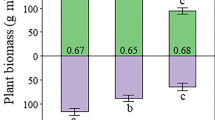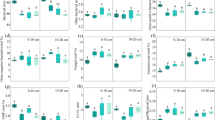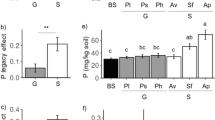Abstract
Grazing management practices are a major factor regulating nutrient cycling and plant growth in grasslands. However, the response of long-term grazing regimes to ecosystem carbon and nitrogen accumulation and plant productivity remains uncertain in karst landscapes. The purpose of this research is to assess the effects of long-term management measures on plant biomass and ecosystem organic carbon (EOCS), total nitrogen (ETNS), and phosphorus (ETPS) stocks in a karst alpine grassland. A 17 year-long field experiment, constituting the methods of grazing exclusion (GE), continuous grazing (CG), mowing and grazing (MG), and rotational grazing (RG) was established in 2001. Plant and soil samples were collected in 2017. Grazing treatments significantly reduced the aboveground and root biomass (MG and RG) compared to GE. SOC of GE was higher than that of CG, MG, and RG in each soil layer. Grazing promoted the mean TN content with a significant increase in CG and RG. GE significantly increased the EOCS and decreased the ETNS and ETPS. The EOCS increased by 22.29% (MG) and 16.31% (RG) and ETNS increased by 7.76% (RG), and MG significantly decreased ETNS compared to CG. EOCS were positively related to SOC, stoichiometry, and aboveground biomass, while being negatively correlated with TP; ETNS were positively related to TN and TP, while being negatively correlated with C/N, C/P, aboveground biomass, and root biomass; ETPS were positively correlated with TN and TP and negatively correlated with NH4+-N and stoichiometry. GE can provide significant improvements in plant recovery and ecosystem carbon stock, whereas RG is beneficial for promoting ecosystem nutrient stock under the condition of pasturing utilisation in the karst grasslands.





Similar content being viewed by others

References
Abdalla M, Hastings A, Chadwick DR, Jones DL, Evans CD, Jones MB, Rees RM, Smith P (2018) Critical review of the impacts of grazing intensity on soil organic carbon storage and other soil quality indicators in extensively managed grasslands. Agr Ecosyst Environ 253:62–81. https://doi.org/10.1016/j.agee.2017.10.023
An H, Li G (2015) Effects of grazing on carbon and nitrogen in plants and soils in a semiarid desert grassland, China. J Arid Land 7:341–349. https://doi.org/10.1007/s40333-014-0049-x
Bai WM, Fang Y, Zhou M, Xie T, Li LH, Zhang WH (2015) Heavily intensified grazing reduces root production in an Inner Mongolia temperate steppe. Agr Ecosyst Environ 200:143–150. https://doi.org/10.1016/j.agee.2014.11.015
Bork EW, Lyseng MP, Hewins DB, Carlyle CN, Chang SX, Willms WD, Alexander MJ (2019) Herbage biomass and its relationship to soil carbon under long-term grazing in northern temperate grasslands. Can J Plant Sci 99:905–916. https://doi.org/10.1139/cjps-2018-0251
Bossio DA, Cook-Patton SC, Ellis PW, Fargione J, Sanderman J, Smith P, Wood S, Zomer RJ, von Unger M, Emmer IM, Griscom BW (2020) The role of soil carbon in natural climate solutions. Nat Sustain 3:391–398. https://doi.org/10.1038/s41893-020-0491-z
Chen LL, Wang KX, Baoyin T (2021) Effects of grazing and mowing on vertical distribution of soil nutrients and their stoichiometry (C: N: P) in a semi-arid grassland of North China. Catena 206:105507. https://doi.org/10.1016/j.catena.2021.105507
Contosta AR, Arndt KA, Campbell EE, Grandy AS, Perry A, Varner RK (2021) Management intensive grazing on New England dairy farms enhances soil nitrogen stocks and elevates soil nitrous oxide emissions without increasing soil carbon. Agr Ecosyst Environ 317:107471. https://doi.org/10.1016/j.agee.2021.107471
Cui Y, Dong Y, Liu H, Sun Z (2021) Short-term grazing exclusions reduced soil organic carbon but not bacterial diversity in the sagebrush desert, Northwest China. Glob Ecol Conserv 31:e01872. https://doi.org/10.1016/j.gecco.2021.e01872
Dai L, Fu R, Guo X, Du Y, Lin L, Zhang F, Li Y, Cao G (2021a) Long-term grazing exclusion greatly improve carbon and nitrogen store in an alpine meadow on the northern Qinghai-Tibet Plateau. Catena 197:104955. https://doi.org/10.1016/j.catena.2020.104955
Dai L, Guo X, Ke X, Du Y, Zhang F, Cao G (2021b) The variation in soil water retention of alpine shrub meadow under different degrees of degradation on northeastern Qinghai-Tibetan plateau. Plant Soil 458:231–244. https://doi.org/10.1007/s11104-020-04522-3
Dai L, Guo X, Ke X, Zhang F, Li Y, Peng C, Shu K, Li Q, Lin L, Cao G, Du Y (2019) Moderate grazing promotes the root biomass in Kobresia meadow on the northern Qinghai–Tibet Plateau. Ecol Evol 9:9395–9406. https://doi.org/10.1002/ece3.5494
de Vries FT, Bloem J, Quirk H, Stevens CJ, Bol R, Bardgett RD (2012) Extensive management promotes plant and microbial nitrogen retention in temperate grassland. PLoS One 7:e51201. https://doi.org/10.1371/journal.pone.0051201
Deng L, Sweeney S, Shangguan Z-P (2014a) Grassland responses to grazing disturbance: plant diversity changes with grazing intensity in a desert steppe. Grass Forage Sci 69:524–533. https://doi.org/10.1111/gfs.12065
Deng L, Zhang Z, Shang GZ (2014b) Long-term fencing effects on plant diversity and soil properties in China. Soil Till Res 137:7–15. https://doi.org/10.1016/j.still.2013.11.002
Díaz S, Lavorel S, Mcintyre S, Falczuk V, Casanoves F, Milchunas DG, Skarpe C, Rusch G, Sternberg M, Noy-Meir I (2007) Plant trait responses to grazing – a global synthesis. Global Change Biol 13:313–341. https://doi.org/10.1111/j.1365-2486.2006.01288.x
Dong L, Martinsen V, Wu Y, Zheng Y, Liang C, Liu Z, Mulder J (2021) Effect of grazing exclusion and rotational grazing on labile soil organic carbon in north China. Eur J Soil Sci 72:372–384. https://doi.org/10.1111/ejss.12952
Dong W, Wu GL, Zhu YJ, Shi ZH (2014) Grazing exclusion effects on above- and below-ground C and N pools of typical grassland on the Loess Plateau (China). Catena 123:113–120. https://doi.org/10.1016/j.catena.2014.07.018
Eze S, Palmer SM, Chapman PJ (2018) Soil organic carbon in grasslands: effects of inorganic fertilizers, liming and grazing in different climate settings. J Environ Manage 223:74–84. https://doi.org/10.1016/j.jenvman.2018.06.013
Ferlan M, Alberti G, Eler K, Batič F, Peressotti A, Miglietta F, Zaldei A, Simončič P, Vodnik D (2011) Comparing carbon fluxes between different stages of secondary succession of a karst grassland. Agr Ecosyst Environ 140:199–207. https://doi.org/10.1016/j.agee.2010.12.003
Feyisa K, Beyene S, Angassa A, Said MY, De Leeuw J, Abebe A, Megersa B (2017) Effects of enclosure management on carbon sequestration, soil properties and vegetation attributes in East African rangelands. Catena 159:9–19. https://doi.org/10.1016/j.catena.2017.08.002
Gai XP, Liu HB, Liu J, Zhai LM, Yang B, Wu SX, Ren TZ, Lei QL, Wang HY (2018) Long-term benefits of combining chemical fertilizer and manure applications on crop yields and soil carbon and nitrogen stocks in North China Plain. Agr Water Manage 208:384–392. https://doi.org/10.1016/j.agwat.2018.07.002
Gan Y, Mooleki SP, Lemke RL, Zentner RP, Ruan Y (2016) Durum wheat productivity in response to soil water and soil residual nitrogen associated with previous crop management. Agron J 108:1468–1478. https://doi.org/10.2134/agronj2015.0244
Gao YZ, Giese M, Lin S, Sattelmacher B, Zhao Y, Brueck H (2008) Belowground net primary productivity and biomass allocation of a grassland in Inner Mongolia is affected by grazing intensity. Plant Soil 307:41–50. https://doi.org/10.1007/s11104-008-9579-3
Gebregergs T, Tessema ZK, Solomon N, Birhane E (2019) Carbon sequestration and soil restoration potential of grazing lands under exclosure management in a semi-arid environment of northern Ethiopia. Ecol Evol 9:6468–6479. https://doi.org/10.5061/dryad.v7t77ts
Ghorbani A, Dadjou F, Moameri M, Fekri A, Andalibi L, Biswas A, Mohammadi Moghadam S, Sharifi J (2021) Effect of grazing exclusion on soil and vegetation characteristics in desert steppe rangelands: a case study from north-western Iran. Arid Land Res Manag 35:213–229. https://doi.org/10.1080/15324982.2020.1850542
Ghosh A, Mahanta SK, Manna MC, Singh S, Bhattacharyya R, Tyagi VC, Singh JB, Ram SN, Srinivasan R, Singh AK, Gupta A, Govindasamy P, Rokde SN (2022) Long-term grazing mediates soil organic carbon dynamics by reorienting enzyme activities and elemental stoichiometry in semi-arid tropical inceptisol. J Soil Sci Plant Nut 22(2):1422–1433. https://doi.org/10.1007/s42729-021-00742-3
Gilmullina A, Rumpel C, Blagodatskaya E, Chabbi A (2020) Management of grasslands by mowing versus grazing–impacts on soil organic matter quality and microbial functioning. Appl Soil Ecol 156(156):103701. https://doi.org/10.1016/j.apsoil.2020.103701
Gong JR, Wang YH, Liu M, Huang YM, Yan X, Zhang ZY, Zhang W (2014) Effects of land use on soil respiration in the temperate steppe of Inner Mongolia, China. Soil Till Res 144:20–31. https://doi.org/10.1016/j.still.2014.06.002
Hafner S, Unteregelsbacher S, Seeber E, Lena B, Xu X, Li X, Guggenberger G, Miehe G, Kuzyakov Y (2012) Effect of grazing on carbon stocks and assimilate partitioning in a Tibetan montane pasture revealed by 13CO2 pulse labeling. Global Change Biol 18:528–538. https://doi.org/10.1111/j.1365-2486.2011.02557.x
He M, Zhou G, Yuan T, van Groenigen KJ, Shao J, Zhou X (2020) Grazing intensity significantly changes the C:N:P stoichiometry in grassland ecosystems. Global Ecol Biogeogr 29(2):355–369. https://doi.org/10.1111/geb.13028
Huang QH, Cai YL, Xing XS (2008) Rocky desertification, antidesertification, and sustainable development in the karst mountain region of Southwest China. Ambio 37:390–392. https://doi.org/10.1579/08-S-493.1
Huangfu J, Mao F, Lu X (2012) Analysis of grassland resources in southwest China. Acta Prataculturae Sinica 21(01):75–82
Husain M, Geelani SN, Bhat GM (2021) Effect of grazing on carbon stock and biomass production in temperate grassland of Kashmir, India. Range Manag Agrofor 42:1–6
Kaiser J (2000) Panel estimates possible carbon ‘sinks’. Science 288:942–943. https://doi.org/10.1126/science.288.5468.942
Kiær LP, Weisbach AN, Weiner J (2013) Root and shoot competition: a meta-analysis. J Ecol 101:1298–1312. https://doi.org/10.1111/1365-2745.12129
Kumar M, Kundu DK, Ghorai AK, Mitra S, Singh SR (2018) Carbon and nitrogen mineralization kinetics as influenced by diversified cropping systems and residue incorporation in Inceptisols of eastern Indo-Gangetic Plain. Soil Till Res 178:108–117. https://doi.org/10.1016/j.still.2017.12.025
Lefcheck JS (2016) piecewiseSEM: piecewise structural equation modelling inr for ecology, evolution, and systematics. Methods Ecol Evol 7(5):573–579. https://doi.org/10.1111/2041-210x.12512
Leu S, Ben-Eli M, Mor-Mussery A (2021) Effects of grazing control on ecosystem recovery, biological productivity gains, and soil carbon sequestration in long-term degraded loess farmlands in the Northern Negev, Israel. Land Degrad Dev 32:2580–2594. https://doi.org/10.1002/ldr.3923
Li J, Wang K, Shangguan Z, Deng L (2022) Coupling and decoupling of soil carbon, nitrogen and phosphorus stocks following grazing exclusion in temperate grasslands. Catena 211:106003
Li W, Cao W, Wang J, Li X, Xu C, Shi S (2017) Effects of grazing regime on vegetation structure, productivity, soil quality, carbon and nitrogen storage of alpine meadow on the Qinghai-Tibetan Plateau. Ecol Eng 98:123–133. https://doi.org/10.1016/j.ecoleng.2016.10.026
Li W, Huang HZ, Zhang ZN, Wu GL (2011) Effects of grazing on the soil properties and C and N storage in relation to biomass allocation in an alpine meadow. J Soil Sci Plant Nut 11:27–39. https://doi.org/10.4067/S0718-95162011000400003
Li YQ, Zhou XH, Brandle JR, Zhang TH, Chen YP, Han JJ (2012) Temporal progress in improving carbon and nitrogen storage by grazing exclosure practice in a degraded land area of China’s Horqin Sandy Grassland. Agr Ecosyst Environ 159:55–61. https://doi.org/10.1016/j.agee.2012.06.024
Louhaichi M, Ghassali F, Salkini AK, Petersen SL (2012) Effect of sheep grazing on rangeland plant communities: case study of landscape depressions within Syrian arid steppes. J Arid Environ 79:101–106. https://doi.org/10.1016/j.jaridenv.2011.11.024
Lu XY, Yan Y, Sun J, Zhang XK, Chen YC, Wang XD, Cheng GW (2015) Carbon, nitrogen, and phosphorus storage in alpine grassland ecosystems of Tibet: effects of grazing exclusion. Ecol Evol 5:4492–4504. https://doi.org/10.1002/ece3.1732
Mipam TD, Chen S, Liu J, Miehe G, Tian L (2021) Short-term yak-grazing alters plant-soil stoichiometric relations in an alpine meadow on the eastern Tibetan Plateau. Plant Soil 458:125–137. https://doi.org/10.1007/s11104-019-04401-6
Mipam TD, Zhong LL, Liu JQ, Miehe G, Tian LM (2019) Productive overcompensation of alpine meadows in response to yak grazing in the eastern Qinghai-Tibet Plateau. Front Plant Sci 10:925. https://doi.org/10.3389/fpls.2019.00925
Mosier S, Apfelbaum S, Byck P, Calderon F, Teague R, Thompson R, Cotrufo MF (2021) Adaptive multi-paddock grazing enhances soil carbon and nitrogen stocks and stabilization through mineral association in southeastern U.S. grazing lands. J Environ Manage 288:112409. https://doi.org/10.1016/j.jenvman.2021.112409
Niu D, Hall SJ, Fu H, Kang J, Qin Y, Elser JJ (2011) Grazing exclusion alters ecosystem carbon pools in Alxa desert steppe. New Zeal J Agr Res 54:127–142. https://doi.org/10.1080/00288233.2011.576683
Oenema O, Oudendag D, Velthof GL (2007) Nutrient losses from manure management in the European Union. Livest Sci 112:261–272. https://doi.org/10.1016/j.livsci.2007.09.007
Reeder JD, Schuman GE, Morgan JA, Lecain DR (2004) Response of organic and inorganic carbon and nitrogen to long-term grazing of the shortgrass steppe. Environ Manage 33:485–495. https://doi.org/10.1007/s00267-003-9106-5
Schönbach P, Wan H, Gierus M, Bai Y, Müller K, Lin L, Susenbeth A, Taube F (2011) Grassland responses to grazing: effects of grazing intensity and management system in an Inner Mongolian steppe ecosystem. Plant Soil 340:103–115. https://doi.org/10.1007/s11104-010-0366-6
Shipley B (2000) A new inferential test for path models based on directed acyclic graphs. Struct Equ Modeling 7(2):206–218. https://doi.org/10.1207/s15328007sem0702_4
Snyman HA (2005) Rangeland degradation in a semi-arid South Africa—I: Influence on seasonal root distribution, root/shoot ratios and water-use efficiency. J Arid Environ 60:457–481. https://doi.org/10.1016/j.jaridenv.2004.06.006
Su J, Xu F (2021) Root, not aboveground litter, controls soil carbon storage under grazing exclusion across grasslands worldwide. Land Degrad Dev 32:3326–3337. https://doi.org/10.1002/ldr.4008
Sun DS, Wesche K, Chen DD, Zhang SH, Wu GL, Du GZ, Comerford NB (2011) Grazing depresses soil carbon storage through changing plant biomass and composition in a Tibetan alpine meadow. Plant Soil Environ 57:271–278. https://doi.org/10.17221/7/2011-PSE
Sun H (2014) Study on herbage nutrients and botanical heterogeneity formation of grass+white clover grassland in Guizhou Plateau. Dissertation, Lanzhou University
Sun J, Wang X, Cheng G, Wu J, Hong J, Niu S (2014) Effects of grazing regimes on plant traits and soil nutrients in an alpine steppe, Northern Tibetan Plateau. PLoS One 9:e108821. https://doi.org/10.1371/journal.pone.0108821
Vaieretti MV, Conti G, Poca M, Kowaljow E, Gorne L, Bertone G, Cingolani AM, Perez-Harguindeguy N (2021) Plant and soil carbon stocks in grassland patches maintained by extensive grazing in the highlands of central Argentina. Austral Ecol 46:374–386. https://doi.org/10.1111/aec.12992
Vivanco L, Austin AT (2006) Intrinsic effects of species on leaf litter and root decomposition: a comparison of temperate grasses from North and South America. Oecologia 150:97–107. https://doi.org/10.1007/s00442-006-0495-z
Wang M, Wang S, Cao Y, Jiang M, Wang G, Dong Y (2021) The effects of hummock-hollow microtopography on soil organic carbon stocks and soil labile organic carbon fractions in a sedge peatland in Changbai Mountain, China. Catena 201:105204. https://doi.org/10.1016/j.catena.2021.105204
Wu XW, Wang YC, Sun SC (2021) Long-term fencing decreases plant diversity and soil organic carbon concentration of the Zoige alpine meadows on the eastern Tibetan plateau. Plant Soil 458:191–200. https://doi.org/10.1007/s11104-019-04373-7
Xiao Y, Liu X, Zhang L, Song Z, Zhou S (2021) The allometry of plant height explains species loss under nitrogen addition. Ecol Lett 24:553–562. https://doi.org/10.5061/dryad.5x69p8d21
Xiong DP, Shi PL, Sun YL, Wu JS, Zhang XZ (2014) Effects of grazing exclusion on plant productivity and soil carbon, nitrogen storage in alpine meadows in northern Tibet, China. Chinese Geogr Sci 24:488–498. https://doi.org/10.1007/s11769-014-0697-y
Xu L, He N, Yu G (2020) Nitrogen storage in China’s terrestrial ecosystems. Sci Total Environ 709:136201. https://doi.org/10.1016/j.scitotenv.2019.136201
Yan L, Li Y, Wang L, Zhang X, Wang J, Wu H, Yan Z, Zhang K, Kang X (2020) Grazing significantly increases root shoot ratio but decreases soil organic carbon in Qinghai-Tibetan Plateau grasslands: a hierarchical meta-analysis. Land Degrad Dev 31:2369–2378. https://doi.org/10.1002/ldr.3606
Yang X, Wang BR, An SS (2021) Root derived C rather than root biomass contributes to the soil organic carbon sequestration in grassland soils with different fencing years. Plant Soil 469:161–172. https://doi.org/10.1007/s11104-021-05144-z
Yu L, Chen Y, Sun W, Huang Y (2019) Effects of grazing exclusion on soil carbon dynamics in alpine grasslands of the Tibetan Plateau. Geoderma 353:133–143. https://doi.org/10.1016/j.geoderma.2019.06.036
Yu LF, Sun WJ, Huang Y (2021) Grazing exclusion enhances plant and topsoil carbon stocks in arid and semiarid grasslands. Agr Ecosyst Environ 320:107605. https://doi.org/10.1016/j.agee.2021.107605
Zhang B, Thomas BW, Beck R, Willms WD, Zhao M, Hao X (2018) Slope position regulates response of carbon and nitrogen stocks to cattle grazing on rough fescue grassland. J Soil Sediment 18:3228–3234. https://doi.org/10.1007/s11368-018-1992-5
Zhou GY, Zhou X, He Y, Shao JJ, Hu ZH, Liu RQ, Zhou HM, Hosseinibai S (2017) Grazing intensity significantly affects belowground carbon and nitrogen cycling in grassland ecosystems: a meta-analysis. Global Change Biol 23:1167–1179. https://doi.org/10.1111/gcb.13431
Zhou Y, Ding Y, Li H, Xu X, Li Y, Zhang W, Lin H (2020) The effects of short-term grazing on plant and soil carbon and nitrogen isotope composition in a temperate grassland. J Arid Environ 179:104198. https://doi.org/10.1016/j.jaridenv.2020.104198
Zhu A, Liu H, Wang Y, Sun H, Han G (2021) Grazing intensity changed the activities of nitrogen assimilation related enzymes in desert Steppe Plants. BMC Plant Biol 21:436. https://doi.org/10.1186/s12870-021-03205-0
Acknowledgements
We would like to thank Ling Luo and Qiumei Zhao for their help with field soil sampling and measurement.
Funding
This study was funded by the National Natural Science Foundation of China (41701081, 42061013), Guizhou Provincial Science and Technology Projects (QKHJC-ZK[2022]146, QKHJC[2020]1Y118), Young Talents Project of Guizhou Education Department (KY[2017]119), and Guizhou Science and Technology Project ([2018 ]4007(006)).
Author information
Authors and Affiliations
Corresponding author
Ethics declarations
Conflict of Interest
The authors declare no competing interests.
Additional information
Publisher’s note
Springer Nature remains neutral with regard to jurisdictional claims in published maps and institutional affiliations.
Rights and permissions
Springer Nature or its licensor (e.g. a society or other partner) holds exclusive rights to this article under a publishing agreement with the author(s) or other rightsholder(s); author self-archiving of the accepted manuscript version of this article is solely governed by the terms of such publishing agreement and applicable law.
About this article
Cite this article
Yang, S., Zhang, T., He, T. et al. Long-Term Grazing Exclusion Increases Ecosystem Carbon Stock but Decreases Nitrogen Stock in the Karst Alpine Grassland of China. J Soil Sci Plant Nutr 23, 3714–3725 (2023). https://doi.org/10.1007/s42729-023-01292-6
Received:
Accepted:
Published:
Issue Date:
DOI: https://doi.org/10.1007/s42729-023-01292-6



